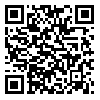Volume 72, Issue 12 (March 2015)
Tehran Univ Med J 2015, 72(12): 838-846 |
Back to browse issues page
Download citation:
BibTeX | RIS | EndNote | Medlars | ProCite | Reference Manager | RefWorks
Send citation to:



BibTeX | RIS | EndNote | Medlars | ProCite | Reference Manager | RefWorks
Send citation to:
Jouyan N, Saffari B, Davoudi-Dehaghani E, Saliani N, Senemar S, Bahari M, et al . Association of usf1s2 variant in the upstream stimulatory factor 1 gene with premature coronary artery disease in southern population of Iran. Tehran Univ Med J 2015; 72 (12) :838-846
URL: http://tumj.tums.ac.ir/article-1-6535-en.html
URL: http://tumj.tums.ac.ir/article-1-6535-en.html
Najmeh Jouyan * 
 1, Babak Saffari2
1, Babak Saffari2 
 , Elham Davoudi-Dehaghani3
, Elham Davoudi-Dehaghani3 
 , Negar Saliani4
, Negar Saliani4 
 , Sara Senemar5
, Sara Senemar5 
 , Marzieh Bahari5
, Marzieh Bahari5 
 , Neda Jouyan6
, Neda Jouyan6 
 , Mohammad Ali Ostovan7
, Mohammad Ali Ostovan7 


 1, Babak Saffari2
1, Babak Saffari2 
 , Elham Davoudi-Dehaghani3
, Elham Davoudi-Dehaghani3 
 , Negar Saliani4
, Negar Saliani4 
 , Sara Senemar5
, Sara Senemar5 
 , Marzieh Bahari5
, Marzieh Bahari5 
 , Neda Jouyan6
, Neda Jouyan6 
 , Mohammad Ali Ostovan7
, Mohammad Ali Ostovan7 

1- Institute of Biochemistry and Biophysics (IBB), University of Tehran, Tehran, Iran. Human Genetic Research Group, Iranian Academic Center for Education, Culture & Research (ACECR), Fars Province Branch, Shiraz, Iran. , n.jooyan@ut.ac.ir
2- School of Biology, College of Sciences, University of Tehran, Tehran, Iran. Human Genetic Research Group, Iranian Academic Center for Education, Culture & Research (ACECR), Fars Province Branch, Shiraz, Iran.
3- Department of Medical Genetics, Tehran University of Medical Sciences, Tehran, Iran.
4- School of Biology, College of Sciences, University of Tehran, Tehran, Iran.
5- Human Genetic Research Group, Iranian Academic Center for Education, Culture & Research (ACECR), Fars Province Branch, Shiraz, Iran.
6- Department Internal Medicine School of Medicine, Booshehr University of Medical Sciences, Booshehr, Iran.
7- Department of Cardiology, Shiraz University of Medical Sciences, Shiraz, Iran.
2- School of Biology, College of Sciences, University of Tehran, Tehran, Iran. Human Genetic Research Group, Iranian Academic Center for Education, Culture & Research (ACECR), Fars Province Branch, Shiraz, Iran.
3- Department of Medical Genetics, Tehran University of Medical Sciences, Tehran, Iran.
4- School of Biology, College of Sciences, University of Tehran, Tehran, Iran.
5- Human Genetic Research Group, Iranian Academic Center for Education, Culture & Research (ACECR), Fars Province Branch, Shiraz, Iran.
6- Department Internal Medicine School of Medicine, Booshehr University of Medical Sciences, Booshehr, Iran.
7- Department of Cardiology, Shiraz University of Medical Sciences, Shiraz, Iran.
Abstract: (6651 Views)
Background: Polymorphisms of the upstream transcription factor 1 (USF1) have been associated with familial combined hyperlipidemia (FCHL), type 2 diabetes and coronary heart diseases (CHD). In the current investigation, the association of USF1s2 variant of human USF1 gene with premature coronary artery disease (PCAD) was evaluated in a population from southern Iran. USF1s2 has the best potential as a functional variant .in the USF1 gene.
Methods: In a case-control study USF1s2 variant of human USF1 gene was determined by polymerase chain reaction- restriction fragment length polymorphism (PCR-RFLP) technique using BsiHKA I restriction enzyme for 186 women under 55 years of age and 135 men less than 50 years of age who underwent diagnostic coronary angiography in Saadi, Nemazee and Kowsar Hospitals of Shiraz, between July 2009 and March 2012. Data on the history of familial myocardial infarction or other heart diseases, hypertension, and smoking habit were collected by a simple questionnaire. Blood sugar level and serum lipid profile of all participants were also obtained by measuring the levels of fasting blood sugar (FBS), total cholesterol (TC), triglycerides (TG), low density lipoprotein (LDL) and high-density lipoprotein cholesterol (HDL).
Results: Frequencies of the major (G) and minor (A) alleles of usf1s2 gene variant were 0.74 and 0.26 in the whole population, respectively. Meanwhile, the prevalence of the minor allele was significantly higher in PCAD patients compared with control subjects. This difference remained significant even after adjustment for confounding parameters. Indeed, subjects with mutant homozygous genotype (AA) were about 5 times more likely to suffer from early-onset CAD than those with wild-type homozygous genotype (GG). Moreover, the baseline characteristics of the control subjects and patients were statistically similar for almost all parameters except for the number of male individuals there was no significant difference among various genotypes in the patient group for any of these investigated variables.
Conclusion: It appears that the usf1s2 variant in upstream transcription factor 1 gene is an independent predictor of premature coronary artery disease in our population and applies its effects without affecting blood sugar and lipid levels.
Type of Study: Original Article |
Send email to the article author
| Rights and permissions | |
 |
This work is licensed under a Creative Commons Attribution-NonCommercial 4.0 International License. |



